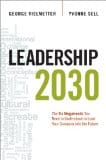Book review: Leadership 2030
This blog is reader-supported. When you purchase something through an affiliate link on this site, I may earn some coffee money. Thanks! Learn more.
Read our review guidelines.
“Change is in the air,” according to Georg Vielmetter and Yvonne Sell in their book Leadership 2030: The Six Megatrends You Need to Understand to Lead Your Company into the Future. “We question the status quo because the business world will soon be very different.” It’s a book that aims to set out what leaders need to know now in order to equip themselves and their businesses for the challenges that they’ll face in the future.
As a result of their investigations, they’ve concluded that 6 ‘megatrends’ will shape how we all work in the future. A megatrend is: “a long term, transformational process with global reach, broad scope, and a fundamental and dramatic impact,” according to their definition. After an introduction, the rest of the book covers these 6 megatrends and how businesses can use them to their advantage.
It is quite interesting, but I’d question the fact that we’ll have to wait until 2030 for them to take effect in business today. The 6 megatrends are below; how many of these are you facing right now on your projects?
6 Trends affecting leadership
Globalisation 2.0
There’s a power shift to developing markets such as China. For leaders, this means we’ll need contextual thinking,
Environmental crisis
Businesses will have to transform the way they work. Small changes, say the authors, are not enough. They also say we’ll be collaborating with competitors for environmental benefit and there will be new sorts of projects on things like carbon reduction as consumers will expect businesses to be able to justify their environmental credentials.
Individualism and value pluralism
People are now exposed to cultural influences from all around world via the internet and global media. They want to be treated as individuals, and businesses will have to ensure projects that deliver products include an option for tailoring and customising the end result to meet that demand. Workplace expectations have also changed. Meaningful work and the right lifestyle are important criteria for candidates choosing a job, and we can surmise that this will have an impact on project teams. I was interested by the research that Vielmetter and Sell use that demonstrates that young people are choosing roles without additional responsibility because they want better lifestyles and aren’t prepared to do the long hours that were common 10 years ago.
Digitalisation
This means that leaders in business overall and on projects will have to focus on robust IT systems and the skills required to lead remote teams. Integrity and reputation management become even more important (but you already manage your online reputation, don’t you?).
Demographic change
As people get older and have fewer children, there’s a shrinking global workforce. “Businesses will no longer be able to marginalise female candidates when it comes to senior positions,” the authors write. “The global talent scarcity will compel companies to open up their boardrooms more readily to women.” I’m not sure that I like sound of that – businesses feeling forced to let women into the C-suite because there aren’t any suitable male candidates, but we have to take advances where we can.
Technological convergence
By this Vielmetter and Sell mean that different branches of science are being blended together, so we end up with advanced robotics and nanotechnologies. Businesses will have to learn to live with uncertainty and plan to innovate ethically. “Scientists will need to find ways to bring together the tried and tested – but very different – procedures of, say IT project management and drug development. Success will depend on the ability of senior technical experts from different fields to cooperate and compromise,” they write.
“For leaders, life under the perfect storm thrown up by the megatrends will be complex, chaotic and overwhelming,” Vielmetter and Sell continue. That might be the case, but it would be important to get on top of that now and work out how you and your projects, and your organisation overall, will deal with these challenges.
Are you altrocentric?
Vielmetter and Sell talk about the requirement for leaders to be altrocentric. This is the opposite of egocentric. In other words, this sort of leader does not seek the spotlight and they understand that “the difference between leaders and followers is contextual.”
Altrocentric leaders are confident but show concern for and understanding of others. They are able to appreciate that they are only one part of the whole and take their ego out of their working relationships and tasks.
The book ends with questions to reflect on to help you establish if you are an altrocentric leader. There is also a section on how to develop those competencies if you don’t feel very altrocentric right now.
Despite my earlier comment, I found Leadership 2030 more forward looking than the project management equivalent: Project Management Circa 2025. Leadership 2030 isn’t a project management text but it’s interesting if you are looking academically at what the business future might bring, or if you are moving into a business role and want to stay ahead of the curve. I would say it is aimed at people who can influence strategy, so mainly C-suite readers. However, if what we are hearing from PMI is true, the trend will be for project leaders to take on business and operational roles, so it could be very valuable for us to equip ourselves with the skills to make all kinds of business work in the future, not just projects.

